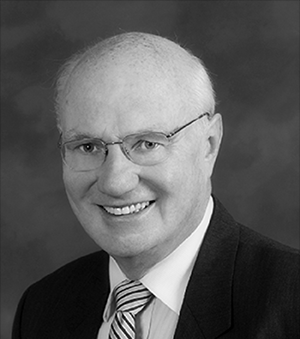In The Shoe Guys, we bring you insight and experience from some of the most prominent figures in business, politics and beyond. We talk business, we talk style, we talk shoes. We recently sat down with David Ganong, Executive Vice-Chair of Ganong Bros. Limited, to talk about the tremendous change throughout his career, what he’s worn, and how success has worn on him, too.
Ganong Bros. Limited is Canada’s oldest independently family-owned and operated chocolate company. It’s been in business for nearly 150 years. For 33 of those years, David Ganong, nephew of R.W. Ganong, was president and CEO of Ganong, the fourth generation Ganong family member to do so. He continues to provide active support to the management team.
“I don't think you become a heritage brand unless you're producing good products that are liked by your consumers,” says Ganong. To this day, all of Ganong’s products are still manufactured in St. Stephen, New Brunswick. While CEO of Ganong, he also had offices with Clarica on the 54th floor at First Canadian Place and in Kitchener, Waterloo. “Very interesting and challenging times for the little guy from St. Stephen,” says Ganong.
Although Maritimers tend to punch above our weight, he didn’t want to cut ties with Atlantic Canada or make Ganong a national organization. “You can be a big fish in a little pond, or you can be a little fish in a big pond. I chose to be a big fish in a little pond, but grew into the bigger pond,” Ganong explains. “When I first came into the business, we competed against an awful lot of Canadian companies. But, now we’re one of the small guys competing against the international giants.”
It seems the only thing constant in one’s career is change—and success comes from how you manage that. “There has been absolutely phenomenal change,” says Ganong. “[Ganong went from a] labor-intensive business to one requiring much higher levels of automation. External forces, such as free trade, caused dramatic changes to the business. Be aware of these forces, even though you just can’t always anticipate them. One needs to be prudent. You have to be very flexible. You need to be accepting of change and embrace it.”
And embrace change he did. Throughout Ganong’s career, he’s been actively involved in corporate and community organizations. Each experience helped Ganong glean new perspectives into the vastly diverse world of work. “The Young Presidents' Organization (YPO) was a very important part of that broadening of my perspective,” explains Ganong. “And the Wallace McCain Institute is very helpful for folks in the Maritimes to gain perspective from experienced business people. Those were grand experiences and great education that helped me broaden my perspective.”
In addition to managing the chocolate company, Ganong also served on the Air Canada board for 17 years, learning firsthand how a very large corporation operated. Even though he was not a chartered accountant, he nonetheless chaired Air Canada’s audit committee and the pension committee, which at the time had north of 10 billion dollars in investments. He also chaired the Clarica board though its merger with SunLife and sat on the SunLife board post-merger. He became chairman of Mutual Life, which Ganong describes as “one of the most challenging times in my business career.”
“I’ve had lots of opportunities to meet some very, very interesting senior people from all walks of life,” says Ganong. One of these opportunities took place during the North American Competitiveness Council, where Ganong connected with President Bush, Prime Minister Harper, as well as senior Cabinet ministers. “You're rubbing shoulders with these guys, and you're giving them advice,” says Ganong. “At that point in time, on the political side, I was dealing with the highest of the high. His comparison between Ganong’s jelly beans and those being manufactured in the United States (which had completely different nutritional label packaging regulations) was used in Bush’s public closing remarks at the summit. As a result, Ganong was inundated with the press for about two days.
“I brought back enormous experience that I could use in our business, which was of course much smaller than some of these big guys that I’d been playing with. It was extremely helpful in developing big idea strategies. It was the connections, the peer group, the big guys with big ideas that rubbed off.”
Ganong’s advice to other people is to “reach out beyond your comfort zone because that's how you learn. Embrace change. The rate of change is going be faster for people starting out today than it was for me starting a few decades ago.” He also advises people to approach business as a humble Maritimer, “listening first before opening your mouth.” He adds “it's not book studying, but studying what's happening in the room. It's best to stand back, shake hands, chat with people. Assess the situation before jumping in.”
His personal style mirrors his unassuming, inspirational management style. When asked about the importance of style and presenting himself with confidence in the business world, Ganong’s humility shines through. “I do like a good quality leather shoe. I mean, I can't wear my sandals for most meetings. I have to dress properly.”
His well-worn shoes have taken Ganong on all walks of life, achieving incredible success every step of the way—but Ganong’s career has also worn on him. “I think I took on too much at times. It wore on me and it wore on the family. My natural inclination is to always say yes. I'm still too damn busy at age 76. I wish I had tempered that a bit better than I did.”
Despite the incredible amount of change that Ganong experienced throughout his career, he earnestly says “I wouldn't change much.” The lesson? Confidently embrace change. Some things—like modesty and a good pair of leather shoes—never go out of style.

